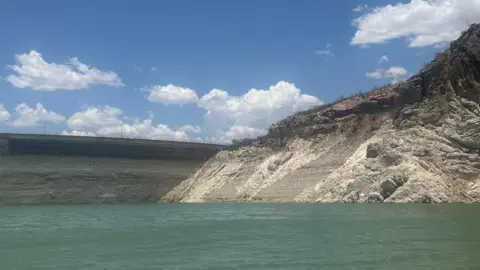The ongoing water shortage conflict between the United States and Mexico has intensified, particularly affecting the northern Mexican state of Chihuahua. The situation escalated as the community of San Francisco de Conchos, facing a catastrophic drought for thirty consecutive months, has resorted to prayer for divine intervention. Local residents stand on the shore of Lake Toronto, a critical reservoir behind the La Boquilla dam, led by a priest as they plead for rain. This once-thriving body of water has now receded, exposing a parched lakebed covered with white rocks, which marks alarming water scarcity in the region.
Rafael Betance, a seasoned volunteer water monitor for the state authority, reflects on the concerning trends in water levels. The dam, which is crucial for local agriculture, has not overflowed since 2017. According to Mr. Betance, current readings show that Lake Toronto is 26.52 meters below its high-water mark, barely achieving less than 14% of its full capacity. Such stark figures underscore the dire need for immediate action to address both the drought and the ensuing disputes over water distribution.
The 1944 water-sharing agreement mandates that Mexico delivers 430 million cubic meters of water annually from the Rio Grande to the United States. These arrangements channel water through tributaries to shared dams, regulated by the International Boundary and Water Commission (IBWC). In exchange, the US provides a significantly larger allocation of approximately 1.85 billion cubic meters from the Colorado River to Mexican border cities, including Tijuana and Mexicali. However, Mexico has struggled to meet its obligations, leaving it significantly in arrears, particularly throughout the 21st century.
Amidst mounting pressure, especially from Texas Republican lawmakers, the Trump administration escalated tensions by threatening to withhold US water supplies from the Colorado River unless Mexico adheres to the treaty stipulations. Trump’s accusations suggested that Mexico was “stealing” water, advocating for tariffs or sanctions until Mexico addresses its shortfall. In contrast, Mexican President Claudia Sheinbaum acknowledged the deficit yet displayed a more diplomatic approach, recently transferring a mere 75 million cubic meters of water—only a fraction of the total owed.
Incidents of violence have marred the discourse surrounding shared water access, exemplified by clashes that resulted in fatalities in September 2020 when Mexican farmers attempted to halt the redirection of vital water supply at La Boquilla’s sluice gates. Local experts have expressed concerns, emphasizing that taking water that isn’t available is futile.
As the drought continues, local farmers in the Rio Grande Valley of Texas voice frustrations over Mexico’s noncompliance with their treaty obligations. Farmer Brian Jones lamented having to cultivate only half his land due to irrigation limitations, claiming that Mexico’s refusal to deliver promised water compounds the issue. He contends that water should have been shared in October 2022—a claim met with stark disagreement from Mexican farmers, who underscore their own dire water shortages.
In Chihuahua, agriculture has faced challenges with significant crops such as walnuts and alfalfa. Many farmers continue to use outdated flooding practices, which have raised sustainability concerns among their Texan counterparts. Farmers like Jaime Ramirez are pioneering more efficient irrigation methods through modern sprinkler systems, which they argue could potentially diminish overall water usage.
But amidst the harsh reality of the drought, the situation remains grave, with fears mounting that without rainfall soon, agricultural practices could cease entirely. Ramirez warns that the continuation of agriculture depends on conservation, poised against the 1944 agreement that many deem outdated in the face of evolving climate conditions and population growth. Farmers from both regions reflect on a tense moment in history, with significant lifelines tying the two communities together through water-sharing, which now threaten to unravel amidst rising tensions. The plea for rain echoes loudly, as both nations face not just a dire water crisis, but a fundamental struggle for survival.












